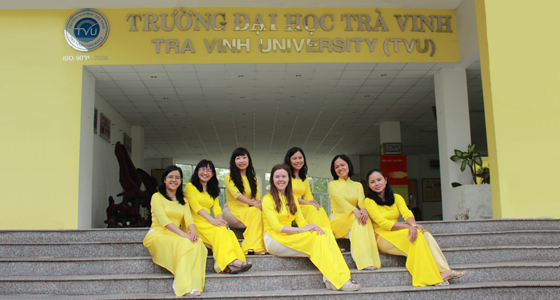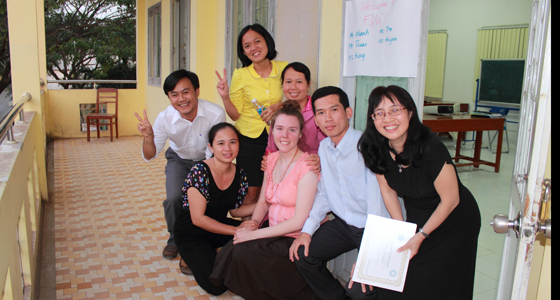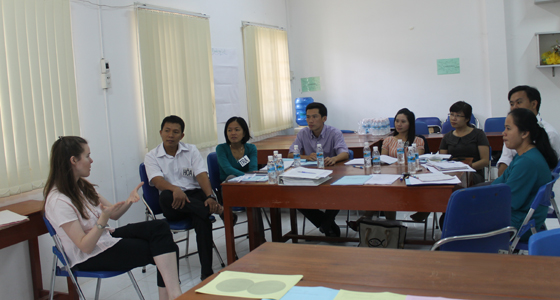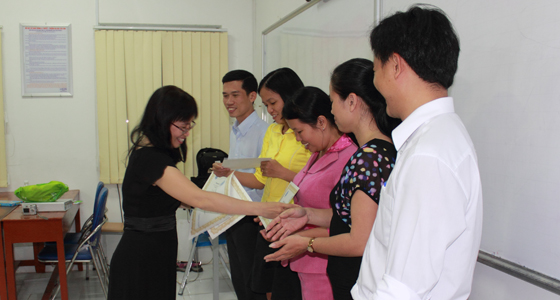 Since 2008, UBC has partnered with Uniterra, an international volunteer agency, to send six UBC staff members from various departments and units to volunteer in the Global South. Participants spend between two and four weeks of their annual vacation contributing to various projects and initiatives based on needs that host organizations identify. Over the years, the Centre for Teaching, Learning and Technology (CTLT) has had several staff members participate in the Leave for Change Program. This year, from January 2-26, 2014, CTLT Learning Design and Curriculum Consultant, Roselynn Verwoord, worked in the Center of Teaching and Learning at Tra Vinh University (TVU) in Tra Vinh, Vietnam. TVU, originally founded as Tra Vinh Community College, was established in 2001 under the framework of the Vietnam-Canada Community College Project (VCCCP) funded by the Government of Canada. The VCCCP successfully adapted the Canadian community college model to a Vietnamese context through the establishment of a community-based college in Tra Vinh province. In June 2006, the college became a university with the mission of providing multi-level training programs as well as courses at the college, university, and post-university levels. Currently, the University enrolls over 20,000 students.
Since 2008, UBC has partnered with Uniterra, an international volunteer agency, to send six UBC staff members from various departments and units to volunteer in the Global South. Participants spend between two and four weeks of their annual vacation contributing to various projects and initiatives based on needs that host organizations identify. Over the years, the Centre for Teaching, Learning and Technology (CTLT) has had several staff members participate in the Leave for Change Program. This year, from January 2-26, 2014, CTLT Learning Design and Curriculum Consultant, Roselynn Verwoord, worked in the Center of Teaching and Learning at Tra Vinh University (TVU) in Tra Vinh, Vietnam. TVU, originally founded as Tra Vinh Community College, was established in 2001 under the framework of the Vietnam-Canada Community College Project (VCCCP) funded by the Government of Canada. The VCCCP successfully adapted the Canadian community college model to a Vietnamese context through the establishment of a community-based college in Tra Vinh province. In June 2006, the college became a university with the mission of providing multi-level training programs as well as courses at the college, university, and post-university levels. Currently, the University enrolls over 20,000 students.
 While at TVU, Roselynn worked as a teaching methodology development advisor through TVU’s Center of Teaching and Learning to support the University’s commitment to training teachers. The Center of Teaching and Learning is comprised of eight staff members who work in the following areas: Teacher Training and Professional Development, IT and Educational Technology, Soft Skills, Co-op Programs, and Curriculum. The functions of the center include: “acting as an advisory for the University concerning the professional and educational activities of the University; training teachers in teaching methods and in applying information technology in classroom teaching; consulting TVU students about effective learning techniques and strategies and training them on soft skills; consulting all teachers who need support and concern the effective use of learner-centered teaching methods; supplying teaching and learning materials in VCD and DVD, which serves the learning and teaching process at TVU; and managing all Co-op programs and curricula at TVU.”
While at TVU, Roselynn worked as a teaching methodology development advisor through TVU’s Center of Teaching and Learning to support the University’s commitment to training teachers. The Center of Teaching and Learning is comprised of eight staff members who work in the following areas: Teacher Training and Professional Development, IT and Educational Technology, Soft Skills, Co-op Programs, and Curriculum. The functions of the center include: “acting as an advisory for the University concerning the professional and educational activities of the University; training teachers in teaching methods and in applying information technology in classroom teaching; consulting TVU students about effective learning techniques and strategies and training them on soft skills; consulting all teachers who need support and concern the effective use of learner-centered teaching methods; supplying teaching and learning materials in VCD and DVD, which serves the learning and teaching process at TVU; and managing all Co-op programs and curricula at TVU.”
 Specifically, Roselynn was asked to work with TVU’s Center of Teaching and Learning to facilitate a four-day Instructional Skills Workshop (ISW) for TVU instructors. She was also asked to offer a five-day Facilitator Development Workshop (FDW) for the same instructors, in order to help increase the sustainability of the ISW program at TVU. An internationally recognized program, the ISW is designed to enhance the teaching effectiveness of both new and experienced educators. Participants are exposed to theory on learner-centred teaching, and have the opportunity to teach three short lessons and to receive verbal, written, and video feedback from their peers. The FDW is designed for individuals who will be facilitating the ISW, and provides participants with an opportunity to practice their facilitation skills and to develop strategies for facilitating the group process central to the ISW. Completion of the FDW provides credentials to facilitate an ISW. At UBC, CTLT offers ISWs to both faculty and graduate students, and ensures facilitators, like Roselynn, are trained to facilitate the ISW.
Specifically, Roselynn was asked to work with TVU’s Center of Teaching and Learning to facilitate a four-day Instructional Skills Workshop (ISW) for TVU instructors. She was also asked to offer a five-day Facilitator Development Workshop (FDW) for the same instructors, in order to help increase the sustainability of the ISW program at TVU. An internationally recognized program, the ISW is designed to enhance the teaching effectiveness of both new and experienced educators. Participants are exposed to theory on learner-centred teaching, and have the opportunity to teach three short lessons and to receive verbal, written, and video feedback from their peers. The FDW is designed for individuals who will be facilitating the ISW, and provides participants with an opportunity to practice their facilitation skills and to develop strategies for facilitating the group process central to the ISW. Completion of the FDW provides credentials to facilitate an ISW. At UBC, CTLT offers ISWs to both faculty and graduate students, and ensures facilitators, like Roselynn, are trained to facilitate the ISW.
 For all aspects of the ISW and FDW, Roselynn worked collaboratively with Thuy Tieu, the director of the Center of Teaching and Learning. Although TVU had previously offered an ISW and a FDW in 2010, with the assistance of an ISW facilitator from Vancouver Island University, Thuy was keen to see the ISW fully implemented at TVU. Thuy wanted to have a few staff from the Center of Teaching and Learning, who work in the area of Teacher Training and Professional Development, trained to facilitate the ISW, so that they would have the capacity to do ISW training on their own. With Thuy’s strong background in the ISW, Thuy and Roselynn co-facilitated both the ISW and FDW. Through this process, Thuy became an FDW Trainer, which enables her to offer the FDW at TVU and to train more FDW facilitators. This was a fantastic outcome of the collaboration between Thuy and Roselynn and will increase the sustainability of the program.
For all aspects of the ISW and FDW, Roselynn worked collaboratively with Thuy Tieu, the director of the Center of Teaching and Learning. Although TVU had previously offered an ISW and a FDW in 2010, with the assistance of an ISW facilitator from Vancouver Island University, Thuy was keen to see the ISW fully implemented at TVU. Thuy wanted to have a few staff from the Center of Teaching and Learning, who work in the area of Teacher Training and Professional Development, trained to facilitate the ISW, so that they would have the capacity to do ISW training on their own. With Thuy’s strong background in the ISW, Thuy and Roselynn co-facilitated both the ISW and FDW. Through this process, Thuy became an FDW Trainer, which enables her to offer the FDW at TVU and to train more FDW facilitators. This was a fantastic outcome of the collaboration between Thuy and Roselynn and will increase the sustainability of the program.
Upon reflecting on her experience facilitating the ISW and FDW at TVU, Roselynn wrote:
It has been wonderful to see the model work its magic and to see the participants embrace the facilitator role. In facilitating the FDW, I find myself reflecting on the delicate balance between “telling” and mentoring, and how it is often so much easier to tell, than to mentor. Mentoring requires a relationship, trust, and time. Sometimes there just doesn’t seem to be the time. Our days were long and Thuy was balancing many tasks in addition to co-facilitating the FDW. That being said, when I remind myself of some principles of the ISW (peer-based, learner-centred, participatory), it becomes much easier to remember that “telling” not only impedes many of the ISW principles, but also takes away the space for an individual to develop their own strategies, techniques, and tools. In addition, in facilitating the FDW, I have found myself reflecting on my own facilitation skills. I have learned immensely from Thuy, who lights up the room with her enthusiasm and passion for teaching and learning, and who creates a safe environment with her gentleness and grace. She has taught me that relationships and trust are not just important, but essential in teaching and learning. It is an immense privilege to be able to learn from the participants and Thuy, and to think about the similarities and differences between the things that they are doing in their facilitation and the things that I do as an ISW facilitator. It also serves as an opportunity for me to set new goals in relation to my own facilitation. What a gift!
In reflecting on the experience of working with Roselynn during the ISW and FDW, Thuy wrote:
It was an interesting and meaningful experience not only for me but also for my colleagues to work with Roselynn. The ISW and FDW training provided TVU with a group of teachers who are now capable of delivering the ISW for others. All the ISW and FDW participants have known each other for a long time and after the training they are now closer friends and they strongly believe that it is easy for them to co-facilitate ISW workshops in the future. For myself, I have learned so much from Roselynn and thanked her for showing patience and trust to me. We worked so hard together during the days. Before each workshop we worked on the lesson plans and shared the responsibilities. At the end of each day we sat together for an hour or more to do the reflection. At these moments she supported me by asking me some powerful questions that helped me out to do reflection or giving me some suggestions for improving and preparing for the next day. We all highly appreciated her contribution to our professional development as well as to our University. It was not easy for us to say goodbye to her and we all hope to welcome Hong Linh (her name in Vietnamese that we love to call her) back to TVU in the future.
As with many volunteer programs that send participants to the Global South under the auspices of international development, there is often a concern that the volunteer benefits more than the host organization. This is a concern that Roselynn also shares. She also acknowledges that embracing an attitude of reciprocity can be an important aspect of working through some of the tensions inherent in international development. In the context of her time in Vietnam, facilitating an ISW and a FDW at TVU was a wonderful opportunity to connect both the Center of Learning and Teaching at TVU and UBC’s CTLT, and to lay a foundation for possible future partnerships and collaborations, framed within the spirit of reciprocity. At a more micro-level, since returning to Vancouver, Roselynn has been in contact with many of the workshop participants and staff from the Center of Teaching and Learning. Perhaps the most meaningful aspect of Roselynn’s time at TVU involved the development of relationships with passionate, committed, and keen instructors.
To learn more about Tra Vinh University, please visit the TVU website.
Read Roselynn’s blog posts for more information about the Leave for Change Program and Roselynn’s experiences at Tra Vinh University.
This article was published in the March 2014 CTLT Newsletter, Dialogues. Below is a list of articles included in the issue:
- Upcoming Event: The Changing Pedagogy and Economics of Higher Education
- New Online Course Profile: RELG 306 – Archaeology and the Bible
- UBC and Tra Vinh University: Developing a Relationship through the Instructional Skills Workshop (currently viewing)
- həm̓ləsəm̓ and q̓ələχən House Films Released!
- Truth and Reconciliation at UBC: Reconciliation and LFS 350
Find out more about the CTLT Newsletter, Dialogues.

